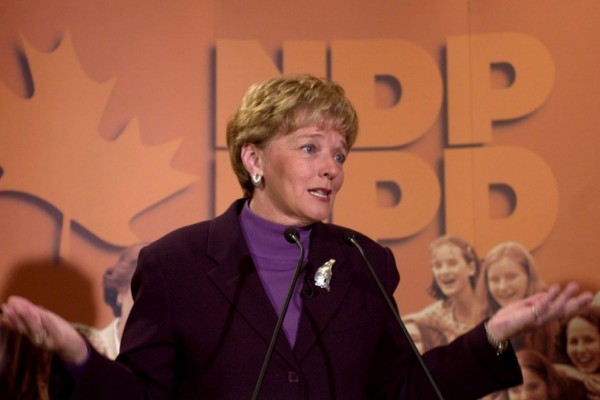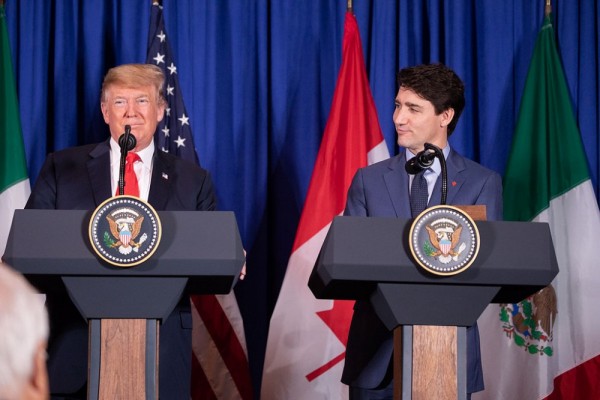NO to NAFTA
When the U.S. government failed to abide by the decision of the NAFTA Extraordinary Challenge Committee (ECC) on the issue of Canadian softwood-lumber exports by returning $5 billion it collected illegally, the Canadian public finally got the message: the North America Free Trade Agreement is a scam.
It’s official, folks: NAFTA was never about free trade. By the time its predecessor, the Canada-U.S. Free Trade Agreement, was negotiated, tariffs had already been eliminated or were negligible for all but a few commodities anyway. For Canada, the free-trade agreement was really only about gaining a dispute-settlement agreement that would protect Canadian exporters from arbitrary measures blocking their access to the huge American market. For the U.S., it was about guaranteed access to our energy.
Has Canada delivered on its part of the pact? As George W. Bush might say, you bet. Since the trade agreement was signed, oil production has increased by roughly two thirds, but oil exports to the U.S. have increased by four times as much. So, despite growing production, Canadian fields actually provide less oil for Canadian consumption than they did two decades ago. Meanwhile, while natural-gas production has doubled over the same period, exports have quadrupled. Exports of both fuels account for fully two thirds of Canadian production today, compared to one-third before the free-trade agreement. This means – according to the infamous “proportional sharing” clause of the agreement – that, in the event of energy shortages, the U.S. would be guaranteed twice as much of Canada’s fuel as Canadians.
For their part, the Americans have reneged on their promise of market access – not once, but several times. The series of denials now stretches to include cattle, beef, steel and potatoes. The simple fact is that, whenever Canadian exports begin to hurt U.S. business interests, the U.S. closes its borders or imposes punishing tariffs, which have the same effect. Moreover, when the U.S. is rebuffed by NAFTA tribunals–something that has occurred several times – NAFTA rules allow them to change their trade laws to permit them to impose these remedies. U.S. negotiators insisted on this escape clause. All the while, under NAFTA rules Canada is prevented from restricting exports of energy–whatever the impact of unlimited exports on domestic supply and prices.
Equally notorious has been NAFTA’s Chapter 11, which allows private companies to sue governments whose policies and regulations are alleged to hurt their opportunities to do business here.
The American Intent
As Mel Clark and David Orchard have argued, what the Americans want out of their repeated challenges to Canadian lumber exports is to wear Canada down until it agrees to privatize its Crown-owned forests, thus opening them up to U.S. ownership. (The U.S. argument, although nowhere supported by NAFTA rulings, says that Canada unfairly subsidizes its softwood-lumber industry, because stumpage fees charged for cutting on crown lands is less than the fees charged in the U.S.) Similarly, the ten trade actions taken thus far against the Canadian Wheat Board, Canada’s largest net earner of foreign currency, have been calculated to bring about the end of the Wheat Board. After that, virtually all movement of Canadian grain would fall into the hands of U.S. multinationals.
Consistent refusal by the Americans to abide by the trade rules they themselves signed into law has elicited cries of foul play from the Canadian NAFTA architects. But cries of “schoolyard bullies” and “jackboot negotiators” – and even threats of retaliation – change nothing. Such responses do nothing to undermine the dubious, media-touted propositions that say “free trade” is essential to Canadian prosperity and that NAFTA is a great agreement. For these critics, the problem is simply with the way the agreement is being administered.
We argue, to the contrary, that the entire relationship between Canada and the U.S. is the problem, along with the manner in which the Canadian economy as a whole is currently organized.
Prosperity is obviously an important issue for Canadians, but prosperity will not be achieved through free trade or an escalating trade war with the U.S. It can only be achieved through the continuous expansion of the economy in a planned way, specifically gearing this expansion to serving the rising material and cultural needs of the people. This requires building a more self-reliant economy, which flourishes by meeting domestic needs and engaging in trade for mutual benefit. It means breaking with the model that says we can do this by exploiting others, by capturing foreign markets and by importing and exporting capital.
The Consequences of NAFTA
Other consequences of NAFTA are still being debated. What is not in question, however, is that this bad agreement has greatly accelerated North American economic integration, thus increasing Canada’s vulnerability to U.S. actions and demands. And extreme dependence on the U.S. market for sales and jobs has given business ever greater leverage in demanding lower taxes, cuts to social programs and reductions in labour and environmental standards. The pity is that the Liberal government, committed as it is to neoliberal economic philosophy, needs little prodding!
Defenders of NAFTA insist that Canada has prospered under its regime. A glance at the thumbnail sketch of socio-economic trends in Canada during the NAFTA years (see sidebar) reveals exactly the opposite.
Continentalism has a history that long antedates NAFTA, but NAFTA gave it a hefty push. We are still living with the repercussions of increased vulnerability. One example is the new security measures, introduced in the wake of 9/11, which include a “no-fly” list, drawn up by U.S. agencies, which bar certain passengers from flying over or landing in the U.S. Perhaps it’s not surprising that the list contains the names of individuals who have no connection with terrorist organizations, but who are noticeably active in various protest movements, like the current one against the U.S. wars in Afghanistan and Iraq.
As former minister of foreign affairs Lloyd Axworthy has written, there can be no doubt, that “Canada has been exceedingly compliant with these security demands, accepting with little challenge the U.S. view of counter-terrorism – to the point of conceding an erosion of basic Canadian Charter rights.”
Once We Quit NAFTA
Many voices, including those of Axworthy, David Orchard and economist Jim Stanford, are now calling for Canada to give notice of our intention to withdraw from NATO. We at Canadian Dimension support this move. Withdrawal from NATO would then allow Canada to negotiate a new trade arrangement with the U.S. under which NAFTA’s zero-tariff provisions would be retained, but the energy-sharing provisions would be sidelined. Other things that would go would include the investment provisions that guarantee American investors national treatment, as well as the right to sue our government. If these changes proved unacceptable to our neighbour to the south, Canada-U.S. trade relations would simply be regulated once more under the authority of the World Trade Organization. Provided, that is, that the WTO survives Hong Kong (see cover story by Tony Clarke).
That the WTO is little more than the international trade and investment instrument of multinational capital, we grant. This explains why U.S. representatives have been attempting to bring many of NAFTA’s most objectionable features into the WTO. But at least the WTO provides a multilateral framework of trade rules with some teeth in its regulations. The WTO is also not bound up with U.S. domestic procedures and trade law. And, while it is set up mainly to serve the interests of the global North, it does provide a somewhat more democratic forum for working out a more balanced global trading arrangement.
In any event, free from the shadow of the U.S., Canada would be in a far better position to negotiate innovative relationships with newly emerging economic powers like China, Brazil, India and South Africa.
None too soon, of course: With peak oil production and supply shortages on the horizon, global conditions could spark a new national energy strategy for Canada. This could conceivably include a national power grid, a massive investment in renewable alternatives, a resuscitated energy-saving railway system and mass urban transit – all of these financed in part by export taxes on oil, gas and electricity.
Within the next five months, Canada will be facing an election. Given the intense anger NAFTA has generated in recent times, it is not impossible to imagine that the agreement could be made into a major election issue. At the very least, the Left should be considering demanding a referendum on withdrawal.
If left unchecked, the trend towards Canada’s further economic, military, social and cultural integration with the U.S. poses a serious danger. Withdrawal from NAFTA would be one major step to reverse this integration. Withdrawal would put Canada on a different path: one in which we would be free to build a more self-reliant economy, as well as to develop sustainable and mutually beneficial trade relationships with other countries.
This article appeared in the November/December 2005 issue of Canadian Dimension (Will the WTO Survive Hong Kong?).









